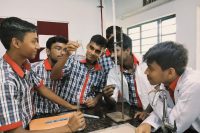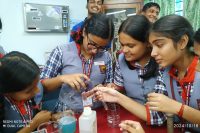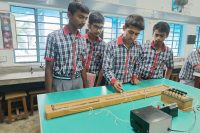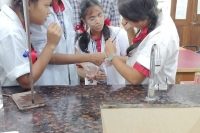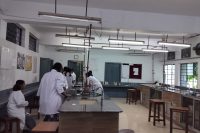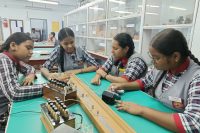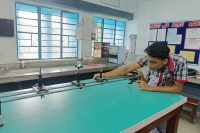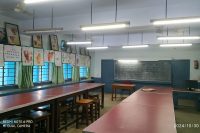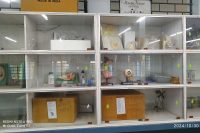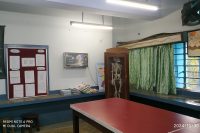Physics Lab:
The Physics lab provides practical experience to complement theoretical learning. Key features include:
- Experiments: Hands-on activities cover topics like force, energy, waves, and thermodynamics. Typical experiments involve measuring gravitational acceleration, studying wave properties, and investigating heat transfer.
- Equipment: The lab is equipped with tools such as spectrometers, thermometers, and mechanical apparatus for precise experimentation.
- Skill Development: Focus on accuracy, analytical thinking, and scientific methodology. Students gain proficiency in using lab instruments and interpreting experimental results.
Chemistry Lab:
The Chemistry lab facilitates the understanding of chemical reactions and properties through direct experimentation. Key aspects include:
- Experiments: Students conduct experiments on reaction rates, chemical bonding, and pH levels. Activities include the synthesis of compounds, performing titrations, and analyzing reaction products.
- Safety Measures: Emphasis on the use of safety equipment like lab coats and safety glasses, along with proper handling and disposal of chemicals.
- Analytical Skills: Students develop skills in observation, data recording, and drawing conclusions from chemical experiments.
Biology Lab:
The Biology lab is designed for exploring biological systems and processes in depth. Key features include:
- Microscopy: Utilization of microscopes to study cellular structures, tissue samples, and microorganisms. Includes slide preparation and specimen observation.
- Experiments: Activities cover genetics, human anatomy, and ecological studies. Students engage in experiments like DNA extraction, enzyme assays, and biodiversity assessments.
- Field Work: Opportunities for outdoor research enhance understanding of biological interactions and environmental factors.
Importance of Labs:
- Conceptual Understanding: Labs make abstract scientific concepts tangible through hands-on experience, bridging the gap between theory and practice.
- Skill Development: Essential skills such as critical thinking, precision, and problem-solving are honed through practical work.
- Future Readiness: Lab experience prepares students for advanced studies and careers in science-related fields, offering a solid foundation for future academic and professional pursuits.



